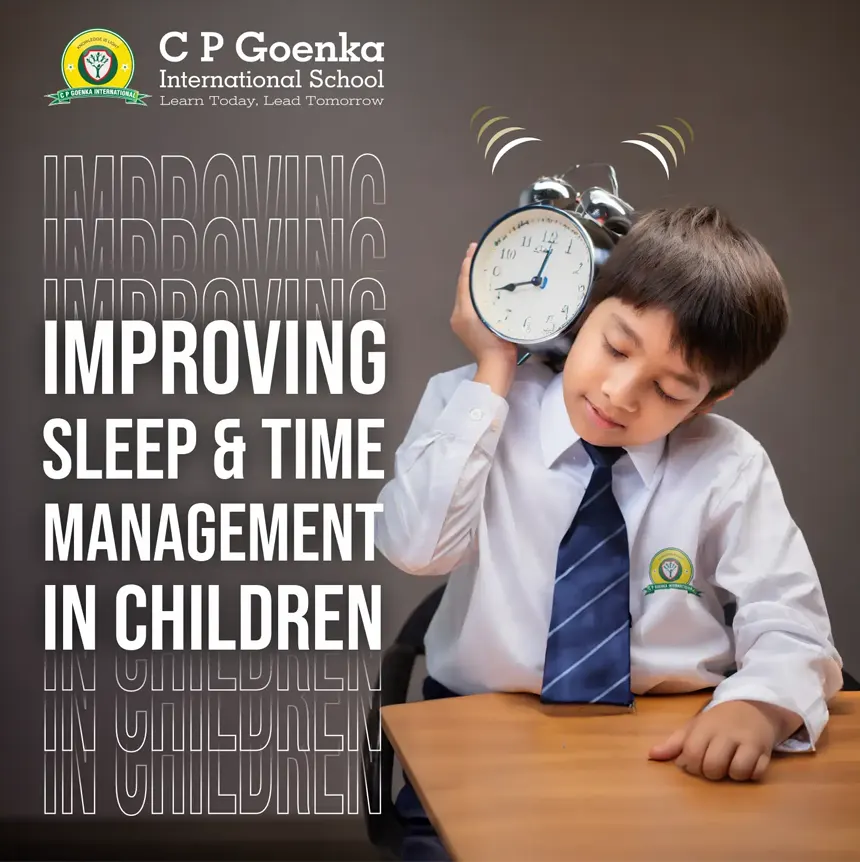
To Top
Improving Sleep And Time Management in Children
Introduction
Getting adequate, quality sleep and developing effective time management abilities are crucial for a child's growth, development, academic performance, and overall well-being. With busy schedules and increasing demands on children's time from an early age, intentionally teaching healthy sleep hygiene and organization skills is vital for setting them up for success. This is especially relevant for parents of children attending international schools in metro cities like Mumbai that often have rigorous academic standards.
This article provides practical tips to help improve sleep and time management in children attending international schools in Mumbai and IGCSE schools in Mumbai. Creating structure through consistent routines, modeling healthy habits, designating spaces conducive to sleep and productivity, and patiently guiding children to prioritize activities can make a tremendous difference.

Assessing Sleep Needs
The first step is understanding the recommended hours of sleep needed for children of different ages. Signs that a child from an international school is not getting adequate rest include difficulty waking up, daytime sleepiness, irritability, and behavioral issues.
Recommended Hours by Age
- 3-5 years: 10-13 hours
- 6-12 years: 9-12 hours
- 13-18 years: 8-10 hours
Signs of Inadequate Sleep
- Difficulty walking in the mornings
- Daytime tiredness
- Irritability
- Hyperactivity
- Difficulty concentrating
- Frequent illnesses
Setting a Consistent Bedtime Routine
Having a soothing and structured bedtime routine is key to quality sleep. This trains the body and mind to wind down as bedtime approaches.
Calming Activities
- Warm bath
- Reading
- Stretching
- Journaling
Managing Screen Time
- No screens 1 hour before bed
- Night Mode settings
- Parental controls
Creating an Organized Home Environment
The home environment impacts a child's ability to sleep and work efficiently. Parents should take time to design spaces to promote focus and rest intentionally. This will be helpful for any kid learning in any international school in Mumbai.
Defining Spaces and Storage
- Declutter rooms
- Use shelves, bins, and labels
- Designate study areas
Scheduling and Planning Ahead
- Family Calendar
- Meal plans
- Activity schedules
Teaching Time Management Skills
Use tools like timers, activity checklists, and daily agendas as early as preschool to nurture time management abilities. Help older kids break down big assignments into steps.
Using Timers and Schedules
- Set time limits for tasks
- Use apps with reminders
Breaking Down Tasks
- Define action steps
- Estimate time per step
Prioritizing Important Activities
- Distinguish urgent vs important
- Schedule priorities first
Overcoming Sleep Issues
The issue may require medical attention if sleep struggles persist despite implementing routine bedtimes.
Sleep Disorders
- Insomnia
- Sleep apnea
- Restless leg syndrome
Seeking Professional Help
If a kid still has serious sleep disorders after improving nighttime rituals and the sleep environment, medical advice may be helpful. A sleep specialist can diagnose a sleep issue. They may suggest eating earlier, exercising earlier, or using light treatment in the morning. Sleep disorders like insomnia may be treated with medicines. An expert assessment is needed to rule out health issues affecting sleep quality and quantity.
For ongoing pediatric sleep difficulties, consider the following:
- Sleep specialists
- Lifestyle changes
- Light therapy
- Medications
Fostering Healthy Habits Long-Term
Forming sustainable sleep and organization patterns takes time and coordination from the whole family.
- Consistency and Patience
- Praise progress
- Adjust approach accordingly
- Don't overschedule
Leading by Example
- Model priority management
- Maintain household order
- Prioritize your sleep
Conclusion
Adequate sleep and time management are imperative for a child's growth and success. By understanding developmental sleep needs, creating restful spaces, teaching organization skills, role-modeling healthy habits, and seeking help when required, parents can significantly help children thrive in academics and beyond. Implementing small, consistent changes pays off multiplying in the long run.











